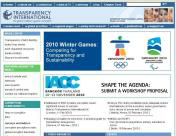Corruption (which can be defined as the abuse of public office for private gain) exists and has always existed. It is pervasive and it has far reaching consequences for the functioning of political regimes as well as for the lives of a large segment of the world’s population. While it may be impossible to eliminate corruption, it is possible to take some steps to curb it and control it.
Corruption is a clear threat to development, democracy and international security. It distorts economic development and subverts political decision-making, stunting growth and creating political instability. It also distorts the proper functioning of democratic institutions. If democracy is defined as the political system in which each citizen has the right to exercise as much influence on the political decision making process as any other citizen, then corruption poses two basic problems for democracy. One problem is that those citizens who use their financial means to corrupt candidates and elected officials, literally acquire the possibility to exercise more influence over the political decision making process than those citizens who do not corrupt politicians. Secondly, corrupt politicians can use their illicitly obtained resources for their electoral campaigns, thus acquiring an advantage over the other candidates and improving their chances of being elected. In so doing, corrupt candidates distort electoral competition, prevent the people’s will from being properly expressed and pervert the nature and the functioning of democratic governance.
In spite of differences in the mandates, perspectives, and priorities of different countries, the international community is increasingly in agreement that there is a causal connection between governance and development. Corruption is seen as the product of poor governance, and a common language has been evolving in recent years linking the issues of corruption with governance and development. There is evidence that highly developed, long established liberal democracies, with a free and widely read press, a high share of women in government, and a history of openness to trade are perceived as less corrupt.
The adoption by almost all countries of the United Nations Convention Against Corruption (UNCAC) has enabled the establishment of international standards that signatories to the convention are committed to meeting. Parliaments have a critical role in ensuring the domestication and enforcement of the convention.
For more information on UNCAC, please click here.
Political institutions are crucially important in determining the incidence of corruption. The political structure, which includes the balance of powers and electoral competitiveness, is likely to determine the incentives for those in office to behave within the law as well as to punish the misbehavior of those who do not. The ability of parliament to actively conduct oversight of the government through its various tools and committees is a critical means of ensuring transparency and accountability in government and its officials.
For more information on this subject, please click here.
Many parliaments have specific mechanisms in place to prevent, impede, disclose, and penalize corruption among Parliamentarians and Political Parties. Some mechanisms seek to make transparent the influence of money on elected representatives, whilst other mechanisms make certain activities illegal. Other mechanisms include codes of conduct and registers of interest, lobbyist registration, lobbying expenditure disclosure, campaign finance contribution and expenditure disclosure, financial limits on contributions to electoral campaigns, bans on taking employment from government sources of funding, voting on issues where there is a personal financial interest and taking employment as a lobbyist after leaving the Parliament.
For more information on preventing corruption by Member of Parliaments, please click here.





